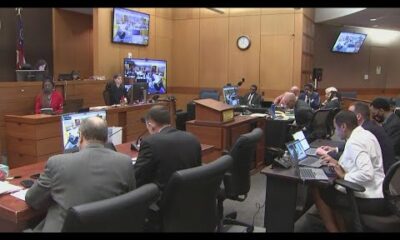Mississippi Today
On this day in 1986


Dec. 2, 1986

Mike Espy became the first Black congressman elected from Mississippi since Reconstruction. Born in Yazoo City, his grandfather was Thomas J. Huddleston Sr., founder of the Afro-American Sons and Daughters, which operated the Afro-American Hospital, providing health care to Black Mississippians until the 1970s. He learned soon about the color line, becoming the only Black student in a newly integrated high school.
He recalled carrying a stick to fend off racist attacks: “Relative to the civil rights experiences of snarling dogs and whips and things it was pretty tame. But I’d always have a fight. The teacher would leave the room, and then you’re among 35 in the classroom and they’d make racial jeers.”
He became a lawyer, working as an attorney for Central Mississippi Legal Services from 1978 to 1980. Between 1980 and 1984, Espy worked as assistant secretary of the Public Lands Division for the State of Mississippi and then served as assistant state attorney general for Consumer Protection.
In 1984, he served on the rules committee for the 1984 Democratic National Convention, drawing the attention of the party. In his historic campaign in 1986, he campaigned door to door for votes with his slogan, “Stand by Me, Pray for Me, Vote for Me.”
While serving as congressman, he emphasized economic development in the Delta, winning reelection three times. In 1993, he became the first Black American to serve as secretary of agriculture, ushering in a wave of reform. Four years later, he was indicted on charges of receiving improper gifts, but a jury acquitted him of all charges.
He ran for the U.S. Senate in 2018, where he lost to Republican incumbent Cindy Hyde-Smith, who drew national attention after she remarked that she would “be in the front row” of a “public hanging” if invited by a political supporter. The remark created a firestorm because of Mississippi’s history of lynchings. She later responded, “For anyone that was offended by my comments, I certainly apologize,” claiming her remark had been twisted and “turned into a weapon” against her.
Espy lost again in a rematch in 2020.
This article first appeared on Mississippi Today and is republished here under a Creative Commons license.![]()
Mississippi Today
On this day in 1967


Dec. 4, 1967

Martin Luther King, Jr. announced creation of the Southern Christian Leadership Conference’s Poor People’s Campaign, a movement to broadly address economic inequalities with nonviolent direct action.
“It must not be just Black people,” argued King, “it must be all poor people. We must include American Indians, Puerto Ricans, Mexicans and even poor whites.”
The idea for the push came from Marian Wright Edelman, who had recently taken U.S. Senator Robert F. Kennedy to witness poverty firsthand in the Mississippi Delta.
When she shared the idea that Washington officials should meet the nation’s most impoverished citizens, King embraced the vision, telling reporters, “We will go there, we will demand to be heard, and we will stay until America responds. If this means forcible repression of our movement, we will confront it, for we have done this before. If this means scorn or ridicule, we embrace it, for that is what America’s poor now receive. If it means jail, we accept it willingly, for the millions of poor already are imprisoned by exploitation and discrimination. … In short, we will be petitioning our government for specific reforms and we intend to build militant, nonviolent actions until that government moves against poverty.”
King talked of a debt that the nation owed Black Americans, who were set free in 1863, “yet they were not given any land to make that freedom meaningful.”
He compared it to an imprisoned man whom authorities learn is innocent, “then going up to the man saying, now you are free. And you don’t give him any bus fare to get to town. You don’t give him any clothes to put on his back. You don’t give him any money to get on his feet in life again. The whole code of jurisprudence would rise up against this and yet, this is what America did to the Black man.”
King didn’t live to see this dream through, assassinated five months later.
This article first appeared on Mississippi Today and is republished here under a Creative Commons license.![]()
Mississippi Today
Mississippi could suffer the most if health insurance subsidies lapse

A new report warns Mississippi could see the steepest drop off in health insurance coverage if Congress doesn’t vote to extend temporary health coverage subsidies at the end of next year.
Over 100,000 Mississippians would lose health insurance – a 43% increase in the state’s already-high uninsured rate – the policy think tank The Urban Institute predicted last month.
“If the enhanced premium tax credits expire, there will be dramatic declines in Marketplace coverage and increases in uninsurance, but the effects will not be felt equally across states or by race, income, and age,” said Jessica Banthin, senior fellow at the Urban Institute in a statement. “Our analysis shows that their expiration could mean some communities may experience greater coverage losses, making healthcare unaffordable and inaccessible.”
The increased subsidies allow Americans to buy health insurance plans on the Affordable Care Act Marketplace at lower costs with enhanced premium tax credits. The benefits were first authorized by Congress in 2021 to help more Americans attain health care coverage during the COVID-19 pandemic.
They also allowed more Americans than before to access the premium tax credits by raising the income ceiling for eligibility and allowed low-income households to access insurance without paying premiums.
The benefits, which have led to a record high of 21.3 million people insured through the Marketplace nationwide, will expire in December 2025 without a renewal from Congress.
“If (the premium tax credits) go away next year, I’m afraid it will reset us to where we were five years ago, with the Marketplace policies basically becoming catastrophic plans again,” State Health Office Dr. Daniel Edney told Mississippi Today.
Catastrophic plans are designed to cover major medical emergencies but not routine medical care.
Premium payments are expected to increase by over 75% on average if the tax credits expire.
For a 40-year-old living alone in Jackson and making $30,000 annually, the cost of monthly premiums for a silver health insurance plan would rise $93 a month, from $49 to $143, according to KFF.
The Marketplace is a federally or state-operated health insurance exchange where people can shop for and enroll in coverage and access financial assistance based on their income.
The enhanced tax credits have contributed to a significant increase in health care coverage in Mississippi since 2021.
In 2020, 12.9% of Mississippians were uninsured, compared to 10.5% in 2023.
“It’s been a gamechanger,” said Edney.
Health care coverage through the Marketplace in Mississippi has nearly doubled since the benefits were passed, representing the second highest percent increase in the nation behind Texas.
Mississippi remains one of 10 states in the nation not to expand Medicaid coverage, making it more reliant on the Marketplace for affordable health care coverage. Marketplace enrollment rates since 2020 have grown fastest in states with high uninsured rates that have also not expanded Medicaid.
The Urban Institute’s data tool predicts that if the enhanced tax credits are not renewed, 143,000 Mississippians would lose coverage under subsidized Marketplace plans.
Some would have the option to enroll in employer-sponsored coverage or be able to afford health insurance without the additional benefits. But most are forecasted to lose coverage entirely.
Mississippi currently uses the federal exchange, but the Legislature passed a law authorizing the creation of a state-based Marketplace earlier this year, which could incentivize health insurance companies to offer policies at lower costs. But federal officials will not approve Mississippi implementing its own exchange because Gov. Tate Reeves has not yet provided a letter of approval.
This article first appeared on Mississippi Today and is republished here under a Creative Commons license.![]()
Mississippi Today
Citing lack of body, defense casts doubt on Jimmie ‘Jay ‘ Lee’s death

OXFORD – Jimmie “Jay” Lee disappeared on his mother’s birthday.
Every year, Lee would call his mother, Stephanie, to sing “Happy Birthday.” On July 8, 2022, he texted her around 2 a.m. But the 20-year-old never responded after that. Not to Stephanie’s texts. Or to her 92 missed calls.
That’s because just a few hours later, Lee was allegedly killed by Sheldon Timothy Herrington Jr., a fellow student at the University of Mississippi with whom Lee had a secret relationship, the prosecution argued in their opening statement in Herrington’s capital murder trial on Tuesday at the Lafayette County Courthouse.
Lee had gone back to Herrington’s apartment at Herrington’s behest after the two had fought about sex, the prosecution said. Lee was a well-known member of Oxford’s LGBTQ+ community, but Herrington, whose family leads a prominent church in his hometown of Grenada, was not.
“He invited Jay back over with the promise that he was gonna do something he’d never done,” said Gwen Agho, a special prosecutor from Hinds County who joined the case to assist Lafayette County District Attorney Ben Creekmore.
But after 22,000 pages of evidence, 71 search warrants and seven law enforcement agencies, there is no direct evidence to show that Lee is dead, argued state Rep. Kevin Horan in his opening statements defending Herrington.
There is no body, no DNA, no blood and no urine, Horan said. Last week, he successfully moved to exclude evidence from K9 dogs from the DeSoto County Sheriff’s Department that “alerted” to the smell of a dead body in Herrington’s apartment and car after questioning its validity.
Horan also sought to cast doubt on evidence on what may be the strongest piece of circumstantial evidence the prosecution has to offer: A Google search that Herrington allegedly made while Lee was on his way over that reads “how long does it take to strangle someone.”
The search could have been about sexual activity with anyone, not just Lee, Horan said.
“I submit to you, ladies and gentlemen, that at the conclusion of this case, you’re going to have just as many questions then as you have now about whether or not they’ve proven a death,” Horan told the jury.
In fact, Horan said the evidence will show that it was actually Lee who threatened Herrington, because Lee sent a message before heading over telling Herrington “if this goes bad, it’s not gonna be good for you.”
If convicted, Herrington faces the death penalty or life in prison without the possibility of parole.
“You can’t go on objection, you can’t go on speculation, you can’t go on suspicion,” Horan told the jury. “Guesswork. Wonderment. All of those things you can’t do.”
The opening of trial came after jurors arrived late Monday night from Hattiesburg. Two years after Lee went missing, it was sparsely attended. Few sat behind Herrington, who never turned to face the gallery.
But Lee’s family and close friends seem just as committed to justice. Lee’s friends were the first members of the public to enter the courtroom shortly after 8 a.m. Some members of Lee’s family wore shirts with his picture on it.
They were instructed by Judge Kelly Luther to avoid emotional outbursts during testimony. Tissues boxes were placed in front of where Lee’s family sat. The attorneys were also told to keep their cool.
“I anticipate a hotly contested case,” Luther said before proceedings started.
The jury was comprised of eight women and seven men chosen from Forrest County. Eleven were white and four were Black.
During the selection process in Hattiesburg, potential jurors were asked if they had any problem with proof of death because Lee’s body has not been found, and none raised a hand. They were also asked if they knew any members of the LGBTQ community, or if they didn’t want to be exposed to information about a relationship between two men.
In his opening statement, Horan noted the case was touchy, due to Lee and Herrington’s sexual relationship and the emotions of Lee’s mother, who was the state’s first witness on Tuesday.
“The court is gonna instruct you at the conclusion of this case that you cannot allow your sympathy for a mother to come into play here,” Horan told the jury. “Y’all have got to decide this case on the facts.”
Horan also said that the jury will see no evidence to support Herrington’s underlying offense of kidnapping.
“If that didn’t happen, the rest of their case goes like a house of cards,” he said.
Aside from the Google search, Agho did not address the way Herrington allegedly killed Lee in her opening statement.
Instead, she emphasized all the details that police have gathered to prove Lee is no longer living. When Lee’s friend stopped by his apartment at Stephanie’s request, the door was ajar. Lee’s dog was inside. So were his valuables and his clothes.
That fall, Lee was slated to enroll in a master’s degree in social work at Ole Miss, but he never showed up for class. In the two years since he went missing, there have been no more credit card charges under his name, and no more social media posts.
“No more anything,” Agho said. “The plans for grad school? Moot. … All proof that Jay’s no longer with us.”
In November, a Lafayette County judge declared Lee dead, at the request by his parents for a legal declaration of death.
When Stephanie Lee testified, she said the last day she saw her son was on July 7 before he headed back to Oxford after spending the holiday at home in Jackson, according to her testimony.
“What was the last thing you ever heard from your son?” Agho asked.
“It’s your birthday,” she replied.
Justice Reporter Mina Corpuz contributed to this report.
This article first appeared on Mississippi Today and is republished here under a Creative Commons license.![]()
-

 News from the South - Louisiana News Feed5 days ago
News from the South - Louisiana News Feed5 days ago12-year-old boy overcomes disability to pursue sports, adventures
-

 News from the South - Arkansas News Feed7 days ago
News from the South - Arkansas News Feed7 days agoUniversity of Arkansas- Fort Smith food pantry keeps students fed around the holidays
-

 News from the South - Georgia News Feed7 days ago
News from the South - Georgia News Feed7 days agoJurors to continue deliberating after holiday on YSL RICO trial
-

 News from the South - Arkansas News Feed6 days ago
News from the South - Arkansas News Feed6 days agoCare Community Center serves hundreds with free Thanksgiving meal
-

 News from the South - Alabama News Feed5 days ago
News from the South - Alabama News Feed5 days agoThe next several mornings will be freezing cold all across Central Alabama.
-

 News from the South - Alabama News Feed4 days ago
News from the South - Alabama News Feed4 days agoFreezing conditions in Alabama's forecast through Wednesday. Chilly afternoon for Iron Bowl Satur…
-

 News from the South - Texas News Feed6 days ago
News from the South - Texas News Feed6 days agoMan arrested in connection with fatal shooting of 19-year-old on North Side, affidavit says
-

 Mississippi Today5 days ago
Mississippi Today5 days agoOn this day in 1961


























